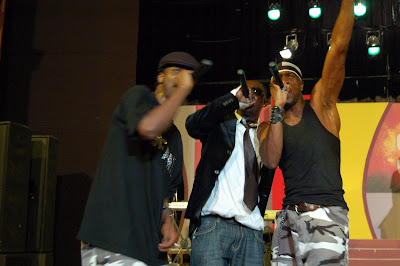(first published by Graphic Showbiz, Accra, Ghana 13 Dec, 2007)

Fisherman Eugene and colleagues pull fish from the sea in Cape Coast. Photo by Ololade Adewuyi
A quiet old town with small winding streets, Cape Coast lies on the Gulf of Guinea, about two hundred kilometres from Accra. It is dotted by a large number of hills which the residents have found as a good abode for their homes. A first time visitor to Cape Coast will be astounded by the many beautiful homes set on the hills.
The town has traditionally been a fishing community due to its proximity to the Atlantic Ocean. It also served as home for the trans-Atlantic Slave Trade with the many castles situated along its coastline being reminders of slavery’s cruel past. The most famous of them, the Cape Coast Castle, has become a World Heritage Site and a tourist attraction for many who throng its eerie slave cells daily.
But the town’s fishing community still thrives even to this day. Fishermen can be found at all times of the day dragging in nets filled with fish along the white sandy beaches of the town. Like egrets to grazing cattle, one can always find the pervading presence of fish mongers eagerly awaiting the next hoard of fish so they can go selling in the markets.
Cape Coast’s major market is located near the centre of town at a place called the London Bridge. It is so called because of the pride of place it held among the people during the colonial rule of the British. Near the London Bridge is the town’s symbol of a crab called Koto Kraba. It is to this market that all the fish, shrimps and crabs go to be sold to the town’s sea food restaurants and connoisseurs.
But the fish does come at a heavy price to its catchers. The fishermen spend more than twelve hours daily on the sea before making any considerable catch.
Fisherman John Dadzie, 36, spends all day on the sea setting his nets while his colleagues try to pull in the fish from the sea. He works six days a week and rests only on Tuesdays, a day considered a taboo by the Fante to go on the high seas. So he mends his nets. It is a folklore which has been made popular through a stage play titled The Lost Fishermen by Ghana’s foremost artist, the late Saka Acquaye. It tells of a group of men who set out for the high seas on a Tuesday and the trouble that befalls them.
Another fisherman who simply gave his name as Eugene is part of the group that pulls in the fish from the sea. He tells of how the fish have become rare to find these days, hence, the length of time spent at the shore. So when the fish don’t come to the shore they go after them.
“The fish no dey come so we take long here”, he told me matter of fact.
The men have to set their nets as early as 5 O’clock in the morning and wouldn’t be getting any fish until well past midday. It is a frustrating cycle for these men who have several dependants. Not least for the fish sellers who have to wait much longer than before for the fish to arrive.
Abigail Thompson, 22, is a seamstress but she comes out to help her mother buy fish from the men at the shore.
“Now we stay longer before we can sell at the market. The fish are scarce”, she complains.
When the fish is finally pulled in, a flurry of activity engulfs the beach. The many women who have been waiting to get their consignment and the more than two dozen men who have been pulling the nets all day all heave a sigh of relief. So too are the sea gulls that have been hovering all day to pounce on hapless fish through the broken parts of the nets. Everyone is happy to see the fish arrive on shore.
But the joy is short lived when it is apparent that the catch is little and the men have to throw back the eel caught into the sea. The sea has been milked dry of its most impressive assets in this part of the world.

